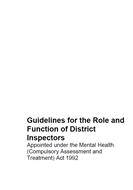Appointed under the Mental Health (Compulsory Assessment and Treatment) Act 1992

Summary
Section 130(a) of the Mental Health (Compulsory Assessment and Treatment) Act 1992 (the Act) states that the Director-General of Health may from time to time issue guidelines for the purposes of the Act.
These guidelines have been prepared to help District Inspectors in the exercise of their powers, duties, and functions pursuant to the Act. As well as exercising the powers, duties and functions outlined in the Act, District Inspectors should develop an awareness of mental health and cultural issues which will assist them in their role.
The Ministry of Health considers the key to the District Inspector role is building and maintaining positive and appropriate working relationships with patients, staff and families/whānau of varying backgrounds and cultures. These relationships, together with those with fellow District Inspectors, the Director and Deputy Director of Mental Health, review tribunal and local police and courts, form the basis of all of the work carried out by District Inspectors. It is the attitude of District Inspectors, as well as their knowledge and skills, which helps ensure that the use of the legislation strikes the right balance between individual and community rights to freedom and to care appropriate to the needs of people suffering from mental disorder.
These guidelines are not a comprehensive interpretation of the Act as it applies to District Inspectors. If District Inspectors have concerns about the propriety of their actions they should seek guidance from the senior advisory District Inspector, or formal legal advice from the Ministry of Health via the Director of Mental Health.
Guide for Distict Inspectors interviewing children and young people
A key role for a District Inspector working with children, young people and their families is to be an effective and appropriate communicator with a full understanding of their rights and obligations under the Act.
Fortunately, the majority of children and young people requiring treatment for mental health (including substance abuse) disorders do not require compulsory treatment. As a result, District Inspectors may have limited opportunities to communicate with young people who are subject to the Act. The Guide for Distict Inspectors interviewing children and young people assists District Inspectors to work effectively with young people under compulsory treatment orders.
Reports and invoices
The reporting template is designed for reports to be consistent. However, the Office of the Director of Mental Health recognises that the duties of District Inspectors are expansive. It is acknowledged that not all of the activities of a District Inspector will be clearly captured in the template categories. Please note that these categories are intended to be inclusive. It is expected that reports will vary and a number of activities not explicitly mentioned in the categories above will be included in some reports when appropriate.
The Ministry of Health requires that District Inspectors use the invoice template. By law, the Ministry is unable to process invoices that are technically incomplete. As original invoices are retained by the Ministry as financial records do not put personal or confidential information in the invoice.
